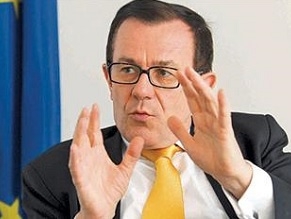|
World Jewish News

A German diplomat, Andreas Reinicke, took his post of EU Mideast Envoy in 2012.
|
EU Mideast Envoy ‘confident’ about Israel-EU agreement on Horizon 2020
03.10.2013, Israel and the World The European Union’s Middle East envoy, Andreas Reinicke, told The Jerusalem Post that he was “confident” Israel and the EU would come to an agreement regarding the EU’s settlement guidelines that would enable Israel’s participation in EU’s flagship research and development programme Horizon 2020.
In July, the EU published guidelines banning EU funding for Israeli entities beyond the Green Line and calling, among other elements, for Israel to sign a “territorial clause” before entering into any new agreements with it. This clause would specify that Israel accepts the European Union’s longtime position that all territories over the Green Line – the West Bank, East Jerusalem and the Golan Heights - do not belong to Israel, a requirement that is contrary to the Israeli government policy.
Before deciding on its participation in Horizon 2020, Israel is seeking clarifications and flexibility from the EU on the implementation of the guidelines.
Last month, EU and Israeli high ranking delegations started negotiations on the issue.
‘’The negotiations are aimed at seeing whether we can find common ground which on one hand will respect European policies and visions regarding the region and on the other hand will allow Israel to be a member of the programme,’’ Israel’s ambassador to the EU, David Walzer has said.
EU foreign policy chief Catherine Ashton has promised to implement the guidelines ‘’in a sensitive and flexible way’’ while their terms are unlikely to be changed by the EU.
An agreement needs to be found in the next few weeks as the first calls for projects in the framework of Horizon 2020 are due to be issued in November.
Israel, if it participates in Horizon 2020, is expected to invest some 600 million euros in the programme over the next seven years, and get back some 900m. euros in inbound grants and investments.
Israel, which has already participate in former EU research and development framework programmes, is one among a few priviliged non-EU member states that were invited to join Horizon 2020.
by: Yossi Lempkowicz
EJP
|
|
